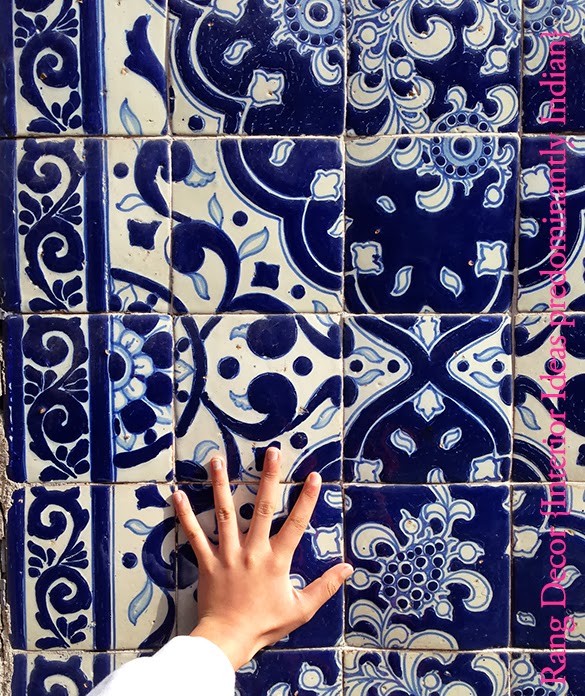While planning our trip to Mexico, Puebla was a destination that had to be part of our itinerary as this is where the famous Talavera Mexican Pottery originated.
 The street numbers and names in Talavera.
The street numbers and names in Talavera.
The Virgin of Guadalupe tiles...
A display of the various stages of the Talavera Pottery….
All pieces are hand-thrown on a potter's wheel. The glazes contain tin and lead, as they have since colonial times. There are only six permitted colors: blue, yellow, black, green, orange and mauve, and these colors must be made from natural pigments. The painted designs have a blurred appearance as they fuse slightly into the glaze. The base, the part that touches the table, is not glazed but exposes the terra cotta underneath.
An inscription is required on the bottom that contains the following information: the logo of the manufacturer, the initials of the artist and the location of the manufacturer in Puebla.
Click here to see a video clip about the process of making Talavera Pottery.
A wide variety of designs...
( Images by Arch and are copyrighted. References Uriarte Talavera, Wikipedia)
As we walked the streets of Puebla, it was evident that Talavera was used extensively in the exteriors of heritage buildings. The creamy White background and the Indigo blue are characteristic Talavera but other colours are also widely used.
The wall of heritage building with Talavera and brick. What a stunning contrast!
Vintage Talavera Tiles…
 The street numbers and names in Talavera.
The street numbers and names in Talavera.Beautiful patterns and designs adorned the outer walls...
The exteriors of building with Talavera tiles used in various styles…
The Mexican post office...
So we headed to Uriarte Talavera to find out more about the history and the process of making these tiles.
Uriarte Talavera was founded in 1824 by Dimas Uriarte. It is the largest exporter of Talavera in Latin America and also a place which attracts skilled artisans from the region.
The entrance of Uriarte Talavera…
Talavera is a type of Majolica pottery that was brought to Mexico by the Spanish. Puebla soon became a hub for the production of these tiles because of the availability of fine natural clay in the region and the demand for these in the building of cathedrals and monasteries.
Talavera pottery reached it's golden period in the mid 17th Century but has struggled since the Mexican war of Independence in the 19th Century with fewer workshops.
Efforts by collectors and artists has revived the tradition and now Puebla has a a extensive collection of Talavera pottery.
A huge Christmas tree with Talavera ornaments:-)
Further efforts have been made to preserve and promote the craft with the introduction of new decorative designs and the passage of the Denominación de Origen de la Talavera law to protect authentic, Talavera pieces made with the original, 16th century methods.
Uriarte Talavera is part of the Certification Board and is working with the Talavera Regulating Council AC.
Tile work at the Uriarte Talavera…
All pieces are hand-thrown on a potter's wheel. The glazes contain tin and lead, as they have since colonial times. There are only six permitted colors: blue, yellow, black, green, orange and mauve, and these colors must be made from natural pigments. The painted designs have a blurred appearance as they fuse slightly into the glaze. The base, the part that touches the table, is not glazed but exposes the terra cotta underneath.
An inscription is required on the bottom that contains the following information: the logo of the manufacturer, the initials of the artist and the location of the manufacturer in Puebla.
The various designs available…
Talavera Tableware...
Galeria Talavera Armando… Another beautiful store.
A wide variety of designs...
Hope you enjoyed the post as much as I loved re-living our memorable trip to Puebla.
Have a great day, while I sip my Talavera mug of Ginger Tea on this cold Minnesotan winter afternoon!






















0 comments:
Post a Comment